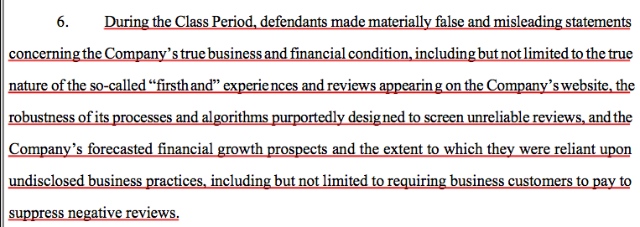A few of you fine commenters chimed in about my Yelp post yesterday, saying I was unfair to criticize CEO Jeremy Stoppelman's comments on San Francisco's housing problem and the lack of diversity in tech. But only one person took issue with my statement that Yelp's business model may be based on extortion — an employee at Yelp.
Yelp's Director of Public Policy Luther Lowe tweeted at me saying "the extortion conspiracy was debunked by an independent HBS study last year" and included a link to the company's blog. Lowe and I are supposed to chat by phone this week, so stay tuned, as I will definitely ask him about a class action lawsuit filed by Yelp shareholders on Wednesday alleging that the company hid its sales tactics and review policies to inflate its stock price, as Gigaom reports.
A quick review of the background here: In 2009, the East Bay Express broke a story about Yelp's sales reps allegedly telling local merchants that if they advertised, negative reviews would be moved or removed, and as recently as March 2014, a Los Angeles Times columnist says this practice is still going on. Local restaurants have also called Yelp's review policies "suspect." In 2011, a class action lawsuit accusing Yelp of extorting advertising money from businesses was tossed out of court.
Now this new lawsuit — which cites that Los Angeles Times article and the fact that in April 2014, the Federal Trade Commission revealed it had received more than 2,000 complaints about Yelp (many related to the extortion issue) — says the company misled investors into believing it was a filtering algorithm doing the behind-the-scenes work and ensuring only reliable “first hand reviews” were featured on the site.
Here are some excerpts from the lawsuit, which you can read in its entirety here:


Curry v Yelp complaint.

Curry v Yelp complaint.
The lawsuit accuses Yelp of violating securities law by hiding this information: In February 2014, the stock was soaring at more than $98 a share, but the price fell to $65.67 per share after the FTC complaints came to light.
When Gigaom reached out to Yelp for comment, the company said it had not read the complaint, but denied its allegations.
[Gigaom]
Curry v Yelp complaint.
